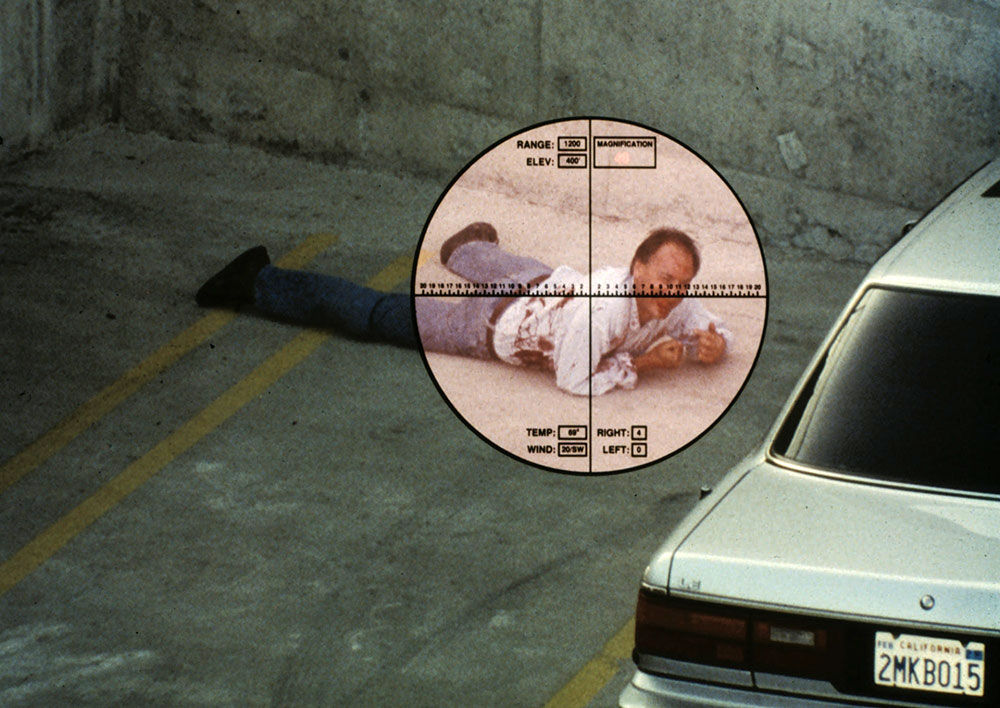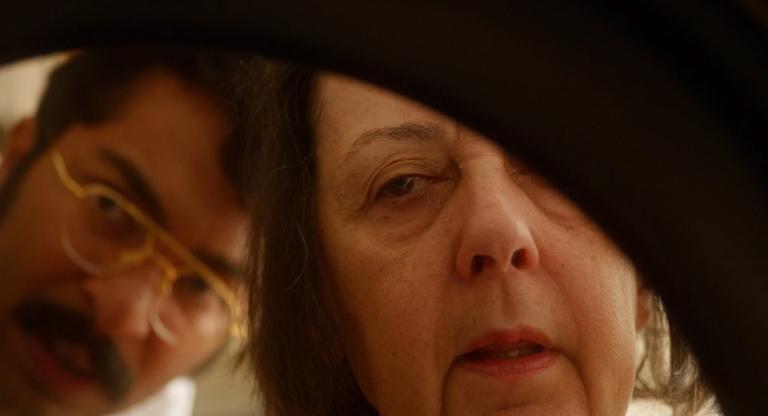Paul Williams’s The November Men (1993) opens with a grainy cable broadcast of Thomas Hayden refuting the claim that “three lone gunmen” assassinated Martin Luther King Jr., John F. Kennedy, and Robert Kennedy. The washed-up director and casual adulterer Arthur Gwenlyn (Paul Williams) watches and decides to make a film about the assassination of George H. W. Bush, inspired in part by the idea that the Left has never successfully committed such a crime. Despite the objections of his partner and cinematographer Elizabeth (the endearingly, endlessly disappointed Leslie Bevis), Gwenlyn hires former Marine sniper Vincent Duggo (played by the film’s screenwriter, James Andronica) as a technical adviser. As Duggo’s mental health deteriorates, and the motley crew of “actors” enthusiastically embrace the film’s supposed plot, Elizabeth reaches out to the Secret Service (as one does) to prevent what she believes is no longer “just a movie” from happening. All parties converge on a fatefully diagrammed intersection as the President’s motorcade rounds a sundrenched corner, waiting to see whether Duggo or his fellow performers will provide Gwenlyn with the impossible shot.
Beyond the Hayden broadcast and Gwenlyn’s initial rant about the unarmed Left, The November Men avoids further political discussion, focusing instead on the foibles and entanglements of the leads, the ineffectual interventions of the Secret Service, and the challenges of producing a feature without funding—save a couple checks from Showgirls’ Robert Davi, who turns down the opportunity to play the assassin in a charismatic cameo on horseback. The gory beheading of Duggo’s obnoxious rock-’n’-roll neighbor and the constant references to Oliver Stone’s JFK (1991) are played for laughs, and the final sequences veer wildly from shocking violence to bizarre treacle, landing on a meta-reveal that reiterates everything that came before.
Though Gwenlyn’s description of the film-within-a-film (titled Cross Point) as a “catharsis for the American nobody” sounds meaningful, and Duggo’s dissolution becomes increasingly melodramatic, The November Men is, more than anything, a comedy. Where the post-postmodern paranoia cinema of the 1970s imbues everything with the weight of hidden meanings and diffuse, threatening power, The November Men’s low-fi aesthetics, empty references, and swinging tonal shifts flatten the elements of metatextual commentary and political thriller into a harmless farce.
When placed within the context of the filmmaker’s biography, as outlined in his recently published Harvard, Hollywood, Hitmen, and Holy Men: A Memoir, the film makes sense as his response to Stone’s. After graduating from Harvard, Williams directed three “counter-culture” films—Out of It (1969), The Revolutionary (1970), and Dealing: or the Berkeley-to-Boston Forty-Brick Lost-Bag Blues (1972). He then partnered with Edward R. Pressman to form Pressman-Williams Enterprises, which produced Brian De Palma’s Sisters (1972) and Phantom of the Paradise (starring a different Paul Williams, 1974) and Terrence Malick’s Badlands (1973). Rather than pursue a filmmaking career beyond the bounds of a New Hollywood that failed to fully embrace him, Williams then “dropped out,” as they said, aiming for better living through chemicals and studying with the learned men of various traditions. This explains why few will likely know to which Paul Williams the November Men credits refer, and why his return to feature filmmaking in the ’90s resulted in two low-budget, straight-to-video films (including Mirage, 1995) whose contribution to the conversation feels deeply personal, decidedly wry—even bitter—and alienated.
The November Men screens this afternoon, April 2, on 35mm at Roxy Cinema as part of their Paul Williams retrospective.



